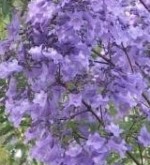 Jacaranda, also called black poui,is a deciduous tree native to South America and a member of the Bignoniaceae family that also includes hardy gloxinia, trumpet vine and catalpa. The bark is thin, smooth and greyish-brown when the tree is young, tuning slightly scaly with maturity. The light-green fern-like leaves are up to eighteen inches long and bipinnately compound each with eighteen to forty eight ½ inch leaflets. For two months beginning in late spring lavender-blue,1.5 inch long flowers appear in twelve inch long terminal panicles all over the tree creating an outstanding floral display. The flowers are trumpet shaped and have a barely visible white throat. When they shed their petals the ground beneath them becomes a mass of lavender-blue adding to the over-all beauty of the vision. Woody, flattened capsules that resemble oyster shells follow. They are two to three inches wide and contain numerous flat winged seeds. Crafters often collect the capsules for use in decorations. Both petals and capsules last a long time on the ground and can be a litter problem. Jacaranda is a popular street tree in tropical and subtropical areas and is grown in pots in colder areas for its foliage.
Jacaranda, also called black poui,is a deciduous tree native to South America and a member of the Bignoniaceae family that also includes hardy gloxinia, trumpet vine and catalpa. The bark is thin, smooth and greyish-brown when the tree is young, tuning slightly scaly with maturity. The light-green fern-like leaves are up to eighteen inches long and bipinnately compound each with eighteen to forty eight ½ inch leaflets. For two months beginning in late spring lavender-blue,1.5 inch long flowers appear in twelve inch long terminal panicles all over the tree creating an outstanding floral display. The flowers are trumpet shaped and have a barely visible white throat. When they shed their petals the ground beneath them becomes a mass of lavender-blue adding to the over-all beauty of the vision. Woody, flattened capsules that resemble oyster shells follow. They are two to three inches wide and contain numerous flat winged seeds. Crafters often collect the capsules for use in decorations. Both petals and capsules last a long time on the ground and can be a litter problem. Jacaranda is a popular street tree in tropical and subtropical areas and is grown in pots in colder areas for its foliage.
 Type: Deciduous flowering tree
Type: Deciduous flowering tree
Outstanding Feature: Flowers, foliage
Form: Irregular, asymmetrical
Growth Rate: Rapid
Bloom: Lavender-blue with white throat, 1.5 inch long, trumpet shaped flowers carried in twelve inch long terminal panicles all over the tree for two months beginning in late spring
Size: 25-60’ H x 15-45’ W
Light: Full sun
Soil: Light, fertile, moist, well-drained
Hardiness: Zones 10-11
Care: Prune to establish framework when young in early spring.
Pests and Diseases: None of significance;
Propagation: Softwood cuttings, graphing, seed